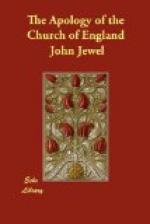But Hosius will here make exclamation, saying we do him wrong, and that these be not his own words, but the words of the heretic Zuenckfeldius. But how then, if Zuenckfeldius make exclamation on the other side, and say, that the same very words be not his, but Hosius’ own words? For tell me where hath Zuenckfeldius ever written them? or, if he have written them, and Hosius have judged the same to be wicked, why hath not Hosius spoken so much as one word to confute them? Howsoever the matter goeth, although Hosius peradventure will not allow of those words, yet he doth not disallow the meaning of the words For well near in all controversies, and namely touching the use of the holy “communion under both kinds,” although the words of Christ be plain and evident, yet doth Hosius disdainfully reject them, as no better than “cold and dead elements;” and commandeth us to give faith to certain new lessons, appointed by the Church, and to I wot not what revelations of the Holy Ghost. And Pighius saith: “Men ought not to believe, no not the most clear and manifest words of the Scriptures, unless the same be allowed for good by the interpretation and authority of the Church.”
And yet, as though this were too little, they also burn the Holy Scriptures, as in times past wicked King Aza did, or as Antiochus or Maximinus did, and are wont to name them heretics’ books. And out of doubt, to see too, they would fain do as Herod in old time did in Jewry, that he might with more surety keep still his dominion: who being an Idumaean born, and a stranger to the stock and kindred of the Jews, and yet coveting much to be taken for a Jew, to the end he might establish to him and his posterity the kingdom of that country, which he had gotten of Augustus Caesar, he commanded all the genealogies and pedigrees to be burnt, and made out of the way, so that there should remain no record whereby he might be known to them that came after that he was an alien in blood: whereas even from Abraham’s time these monuments had been safely kept amongst the Jews, and laid up in their treasury; because in them it might easily and most assuredly be found of what lineage everyone did descend. So (in good faith) do these men, when they would have all their own doings in estimation, as though they had been delivered to us even from the Apostles, or from Christ Himself: to the end there might be found nowhere anything able to convince such their dreams and lies, either they burn the Holy Scriptures, or else they craftily convey them from the people surely.




